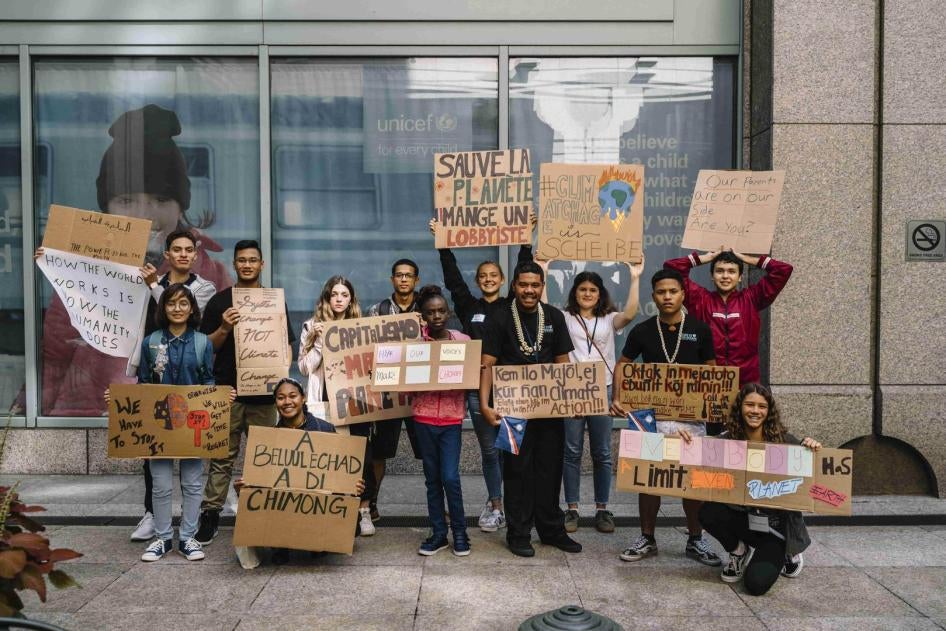A 16-year-old boy named David is one of a group of 15 children who lodged a UN complaint last year against Germany and four other countries for its lagging efforts to fight the global climate crisis. David is from the Marshall Islands, on the front line of climate change.
Exceptionally high tides—called king tides—regularly cause floods and have caused havoc to the shipping dock and restaurant David’s family owns. His family was considering leaving the country because of the threat from rising sea levels and increasing mosquito-borne illness. David knows because he was sick from one, but he doesn’t want to leave his beloved country.
Governments have an obligation to mitigate the human rights harm caused by climate change, including by reducing greenhouse gas emissions. The children contend that Germany along with Argentina, Brazil, France, and Turkey has knowingly perpetuated the climate crisis, violating the international Convention on the Rights of the Child.
Germany, France and Brazil have disputed that the complaint falls within the jurisdiction of the child rights treaty, and therefore whether it should be adjudicated at all. In response, the 15 children from six continents submitted a second legal brief saying that the UN Child Rights Committee, charged with monitoring states’ compliance with the treaty, does have competency to hear their complaint. The most well-known complainant is Greta Thunberg, who helped trigger the youth climate movement by starting a school strike in August 2018.
The youths‘ brief responds to Germany’s argument that its obligations on greenhouse gas emissions do not extend to the 14 children living outside of Germany because emissions in one country do not foreseeably affect the realization of rights in other countries, and that the children’s complaint deals with “abstract” shortcomings of climate policy rather than rights covered in the Child Rights Convention.
These arguments are made at a time when German politicians are debating the urgency of addressing the climate crisis during the Covid-19 pandemic. While some say that German emission reduction goals should be scaled back, others contend that the global health crisis is all the more reason to stick to the original plans or make them more ambitious. Indeed, research shows that air pollution—caused in part by greenhouse gas emissions—is responsible for respiratory and cardiovascular issues that increase health risks for people contracting Covid-19.
In their original complaint to the UN Committee, the young activists accused the five countries of failing to prevent foreseeable climate impacts on children’s rights. These five countries were the top greenhouse gas emitters among the 44 countries that at time of filing had accepted the UN Committee’s jurisdiction to hear individual complaints against them. None of them is meeting its environmental commitments to reduce carbon emissions enough to keep global temperature rises under 1.5°C.
Our own research confirms that children’s rights are at risk because of the impact of climate change. In Turkana, Kenya, for example, we found that climate change reduced local Indigenous communities’ already limited access to food and clean water. Flooding, cyclones, and river erosion occur more often with climate change.
In Bangladesh, we found that some families were more likely to arrange marriages for their underage daughters after losing homes or land to such disasters. In Mozambique, about 1 million children needed humanitarian assistance after Cyclone Idai hit in March 2019. Some local community leaders forced women to trade sex for food assistance.
The UN Committee on the Rights of the Child itself has recognized the harmful effects of the climate crisis on children’s rights, including by holding a special session on child rights and climate change in the Pacific region in March 2020.
The children are asking the Committee to recommend that the five governments accelerate efforts to reduce greenhouse gas emissions and assist other affected countries to prevent further harm for children and future generations.
In the coming weeks, the Committee will decide whether the complaint is admissible. It can only be hoped that the committee will consider the complaint on its merits. Today’s young environmental activists deserve to be heard – and answered.










